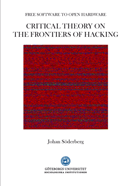Christian Fuchs: Foundations of Critical Media and Information Studies (2011)
Filed under book | Tags: · alternative media, capitalism, critical theory, democracy, finance, information society, internet, marxism, mass media, media studies, theory of value, web 2.0

Foundations of Critical Media and Information Studies lays down foundations for the analysis of media, information, and information technology in 21st century information society, as well as introducing the theoretical and empirical tools necessary for the critical study of media and information. Christian Fuchs shows the role classical critical theory can play for analyzing the information society and the information economy, as well as analyzing the role of the media and the information economy in economic development, the new imperialism, and the new economic crisis. The book critically discusses transformations of the Internet (‘web 2.0’), introduces the notion of alternative media as critical media, and shows the critical role media and information technology can play in contemporary society.
This book provides an excellent introduction to the study of media, information technology, and information society, making it a valuable reference tool for both undergraduate and postgraduate students of subjects such as Media Studies, Sociology of Media, Social Theory, and New Media.
Publisher Routledge, 2011
Routledge Advances in Sociology series
ISBN 1136825312, 9781136825316
384 pages
PDF, PDF (updated on 2014-12-22)
Comment (0)Michael J. Thompson (ed.): Georg Lukács Reconsidered: Critical Essays in Politics, Philosophy and Aesthetics (2011)
Filed under book | Tags: · aesthetics, capitalism, critical theory, cultural criticism, ethics, law, literary criticism, marxism, philosophy, political theory, politics

Georg Lukács stands as a towering figure in the areas of critical theory, literary criticism, aesthetics, ethical theory and the philosophy of Marxism and German Idealism. Yet, despite his influence throughout the twentieth century, his contributions to the humanities and theoretical social sciences are marked by neglect. What has been lost is a crucial thinker in the tradition of critical theory, but also, by extension, a crucial set of ideas that can be used to shed new light on the major problems of contemporary society.
This book reconsiders Lukács’ intellectual contributions in the light of recent intellectual developments in political theory, aesthetics, ethical theory, and social and cultural theory. An international team of contributors contend that Lukács’ ideas and theoretical contributions have much to offer the theoretical paucity of the present. Ultimately the book reintegrates Lukács as a central thinker, not only in the tradition of critical theory, but also as a major theorist and critic of modernity, of capitalism, and of new trends in political theory, cultural criticism and legal theory.
Publisher Continuum, 2011
ISBN 1441108769, 9781441108760
253 pages
PDF, PDF (updated on 2014-12-22)
Comment (0)Johan Söderberg: Free Software to Open Hardware: Critical Theory on the Frontiers of Hacking (2011)
Filed under thesis | Tags: · critical theory, critique, floss, free software, hacking, hardware, open hardware, software, technology

Starting from the experiences of hackers developing free software and open hardware, this thesis addresses some key and recurrent themes in the field of Science and Technology Studies (STS). It poses the question: how are technologies conceptualised, constructed and used in ways that render some aspects of them transparent, while leaving others opaque? This question is complicated by the fact that what is visible and transparent to some will remain opaque to others, depending on the level of technical expertise commanded. The political implications of this stand at the heart of my inquiry. Since technical know-how is unevenly distributed among groups in society, the same concern can be rephrased as follows: How are relations of power and conflict mediated through technology and relations of technical expertise/ignorance? While trying to address this question, the thesis delves into matters of epistemology. Just as programming skills are required for seeing what is going on behind the computer screen, so theoretically informed reflection can be considered necessary for rendering visible social relations not immediately apparent to the casual eye. Discussion of the actions of hackers is therefore combined in this thesis with discussion of the alternative programmes of research which can be applied to the study of these actions. Two programmes of research in particular receive attention: the critical theory of technology and constructivist science and technology studies (STS). Of these two, the relevance of the former tradition is emphasized and its value for research in the STS field defended. The thesis is composed of four articles and an introductory chapter summarizing and encapsulating my concerns. The first article discusses belief in technological determinism among hackers and how this does not necessarily stand in opposition to political engagement. On the contrary, it is common within hacker politics for contending viewpoints to be articulated in relation to seemingly apolitical narratives about technical neutrality and progress. The second article also deals with antagonistic relations at the heart of processes of technological change. It argues that the punitive actions of law enforcement agencies provide a clear indication of the presence of asymmetrical power relations in technological change through, for example, attempts to suppress filesharing inventions. Hackers are negotiating with legal authorities and the mass media, but also amongst themselves, about how to draw the line between the legitimate users and harmful misusers of technology. The third and fourth articles are based on a case study of a group of Czech hardware hackers who invented a wireless network technology for sending data with visible, red light. The challenges faced by these hardware hackers in their attempts to design technical solutions capable of being built by non-expert users are discussed at length in a theoretically-informed fashion.
PhD thesis
University of Gothenburg, Department of Sociology, March 2011
ISSN: 1650-4437
ISBN: 978-91-975442-7-6
68 pages
Creative Commons: Attribution-ShareAlike

